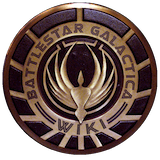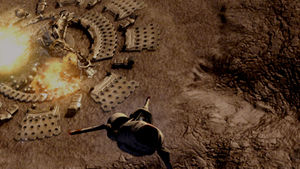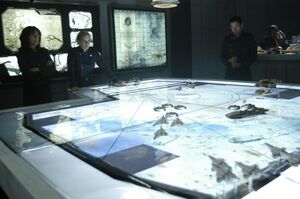This article details an episode of the Original Series. For information on the Re-imagined Series episode of the same name, see The Hand of God (RDM).
|
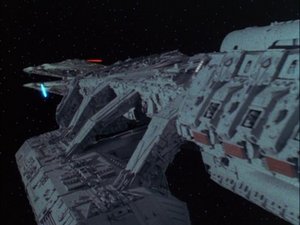
| |||
| "The Hand of God" An episode of the Original Series | |||
|---|---|---|---|
| Episode No. | Season 1, Episode 21 | ||
| Writer(s) | Donald Bellisario | ||
| Story by | |||
| Director | Donald Bellisario | ||
| Assistant Director | |||
| Special guest(s) | |||
| Production No. | 50930 | ||
| Nielsen Rating | |||
| US airdate | |||
| CAN airdate | |||
| UK airdate | |||
| DVD release | 2004-12-28 | ||
| Population | {{{population}}} survivors | ||
| Additional Info | Series Finale | ||
| Episode Chronology | |||
| Previous | Next | ||
| Take the Celestra | The Hand of God | (End of Series) (See Galactica 1980) | |
| [[IMDB:tt{{{imdb}}}|IMDb entry]] | |||
| Listing of props for this episode | |||
| Related Media | |||
| Photo Gallery | @ BW Media | ||
| Promotional Materials | |||
| Online Purchasing | |||
| Amazon: Standard Definition | High Definition | |||
| iTunes: [{{{itunes}}} USA] | |||
- Commander Adama decides to quit running from the Cylons, and launches an all-out attack on a basestar.
Summary
- Apollo is leading Sheba, Starbuck, and Cassiopeia through some unknown parts of Galactica on something of a group date. They climb into a dome, directly over the main thrusters.
- Apollo opens up the shielding on the dome, revealing space all around them. Cassiopeia is frightened, but Apollo explains that they are safe as the walls are constructed from transparent tylinium. Apollo explains that it is a celestial chamber. When Galactica was launched 500 yahren ago, she had several chambers, but only one remains. They were used by navigators to take star sightings to double-check the calculations of the navigation computers.
- The scanners are set for long range Gamma frequencies, an outdated method of communication. Sheba notices that they are receiving a signal on a Gamma frequency. Apollo recognizes something in the signal that looks like ships that used to be flown by the Colonials many yahrens ago.
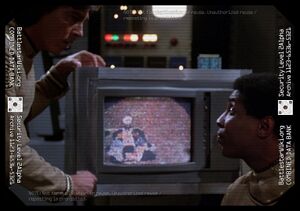
- The date group wakes up Boomer, who speculates that the signal could either be a harmonic signal, with a double or tripling of the original transmitting frequency, in which case the source would be relatively close. If the signal is at its original frequency it would have to be intergalactic to be so weak.
- Adama orders Galactica to scan in the direction of the signal in order to see if it was a harmonic signal originating from nearby. A planetary system is detected in the direction of the transmission, so Adama orders Apollo to take a Viper patrol into the system to take a closer look.
- Apollo, Starbuck, and Sheba fly towards the system. They detect five planets. Starbuck detects a Cylon basestar coming out from behind orbit of the third planet. The Vipers flee hoping they avoided detection.
- The basestar is located in a strategic location on the rim of the galaxy, forcing the fleet to take a long detour if they want to avoid it. Adama thinks that the transmission they received was sent from the basestar as part of an elaborate trap. Tired of running, Adama proposes attacking the basestar.
- Aboard the basestar, a Command Centurion checks the status. A Centurion reports a blip shortly before achieving orbit. The Command Centurion orders a fighter patrol to check the far side of the planet system just to be safe.
- Commander Adama and Colonel Tigh brief the Viper pilots. All Vipers squadrons will be launched in an attempt to draw out the Cylon Raiders. They will be outnumbered two to one. Galactica will attempt to flank around the star system and surprise the basestar, getting the first strike. After that it will be a slugfest.
- Apollo stays after the meeting examining the basestar model. He and Starbuck come up with a plan to use Baltar's Cylon fighter to sneak aboard the basestar and knock out its scanners, ensuring Galactica the first strike. Apollo is able to convince Adama of his plan, however Starbuck's knowledge of the interior of the basestar is too limited (after his brief stay during "War of the Gods, Part I"). Adama decides that the person who would be better able to help them with information would be Baltar himself.
- The Cylon Raiders have found nothing in their search, but the Command Centurion orders them to continue further into the galaxy as long as fuel permits.
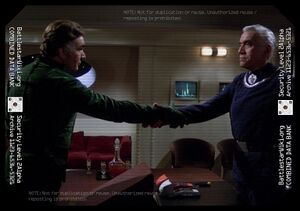
- Adama offers Baltar freedom in exchange for information. Adama would drop Baltar off on a habitable planet that they pass, leaving him with adequate provisions and shelter. Baltar is able to negotiate for a short range communication device as well. Baltar would be set free after the basestar has been destroyed.
- Sheba accuses Apollo of having a death wish since Serina's loss, and reveals her feelings for him. Meanwhile Cassiopeia is asking Starbuck why he has to be on every dangerous mission. Starbuck admits that he sees the danger, but chooses not to dwell on it.
- Boomer gives Apollo and Starbuck an identification transmitter, which would alert their fellow Viper pilots that they are friendly when they return from their mission. He reminds them not to lose the transmitter, or else they will likely be shot at. Starbuck says that if they do lose the transmitter that they'll just waggle their wings.
- Baltar explains that they can probably safely land without clearance. It will be assumed that there is a communications problem on the raider. A centurion will be sent if they don't have any fighters out. The control center is at the bottom of the central core, guarded by a single centurion. They can just destroy the computers outside the command room to blind the basestar.
- Apollo and Starbuck launch the Raider and stumble into the returning Cylon patrol, but are not noticed by the Cylons.
- After the Centurions have disembarked, Apollo and Starbuck leave the hangar and make their way to the central core, and open the hatch. As they climb down a ladder, the Centurion guard looks up, prompting an exchange of laser fire. The Centurion is destroyed, and the warriors are unharmed. They enter the computer room outside the control center, and Starbuck plants the charges while Apollo covers him.
- Galactica launches all of her Vipers and begins her flanking maneuver. The basestar picks up the Vipers on its sensors. The Command Centurion orders all fighters dispatched to intercept the Vipers, and orders sensors to scan for Galactica.
- A Centurion walks in on Starbuck planting the last charge, and is shot in the chest. Apollo and Starbuck flee up the ladder. As Apollo rushes up the ladder he drops the identification transmitter. With several Centurions on their tail, they continue up the ladder anyway. The charges detonate, killing the pursuing Centurions and blinding the basestar.
- The Vipers duel with the raiders. Both sides take losses but the raiders are getting the worst end of it.
- Galactica spots the basestar. Adama orders everyone to battle stations and gets the first shots in, severely damaging the basestar. The basestar detects Galactica and begins to return fire. Galactica sustains heavy damage, but destroys the Cylon basestar.
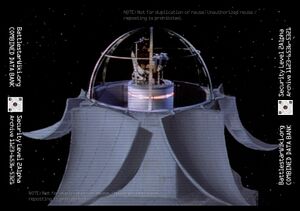
- Galactica issues a recall order to all Vipers. They have not received any signal from the identification transmitter. As several Raiders have made suicide runs towards Galactica, Adama orders another approaching raider destroyed but is stopped by Boomer, who thinks it is Starbuck and Apollo because "they're waggling!"
- After they are safely aboard, Apollo returns to the Celestial chamber, looking for another Gamma frequency signal, which he hopes came from Earth. Apollo expects that first contact will come in the form of routine video or radio scans. Starbuck comes looking for him to return him to the victory celebration. After they exit the Celestial chamber the signal is received again, this time clearer: it is a transmission of the Apollo moon landing, with nobody there to see it.
Notes
- This episode is both the season and series finale of the Original Series.
- This episode is notable in that it has no guest stars and introduces no new characters.
- The title was reused for the tenth episode of the Re-imagined Series. Aside from both Adamas launching an offensive strike against Cylon forces, there is little comparison between the two episodes. The writers of the Re-imagined Series episode claimed that the naming of their episode and the offensive attack plans were coincidental; they weren't aware of this Original Series episode.
- Apollo gives the age of Galactica as being 500 yahrens (years) and given his comments on the removal of her celestial chambers, it can be inferred that Galactica was updated throughout the years.
- The final episode of the Original Series shows not just one, but two authentic items of American space program output.
- The first article, shown in the grainy Gamma transmissions, is camera footage from the return of the ascent stage of an Apollo Lunar Module. Specifically, the footage was of Eagle, the first lunar lander to reach the moon, piloted by Neil Armstrong and Buzz Aldrin in July, 1969.
- The central basestar core was in fact the interior of the mockup or backup vehicle of Skylab, the first United States space station, which was used from 1973 to 1974. Two flight-ready Skylabs were built; the flown station reentered the atmosphere in 1979 to great international fanfare and speculation as to its crash and debris site. The second flight-ready vehicle is available for viewing at the National Air and Space Museum. The mockup resides in the hands of the United States Space & Rocket Center and underwent restoration.
Analysis
- Boomer speculates that the signal they recorded could have be on a harmonic frequency, doubling or quadrupling the original frequency. If it is a harmonic it comes from nearby. The planetary system they scouted has a large Jupiter-like gas giant, a Venus-like planet with a compressed carbon dioxide atmosphere, and a lifeless red Mars-like world. It indicates that it may have been analogous to our solar system, but this isn't explored further for fear that another Cylon basestar might be coming to investigate.
- As inferred from previous episodes, such as "Saga of a Star World" and "The Living Legend, Part II," a Cylon basestar and a Colonial battlestar are evenly matched.
- This episode suggests that Galactica saga takes place hundreds or even thousands of years in the far future. Therefore, Earth would most likely be far enough along technologically and politically to help their brothers from the Colonies. Galactica 1980 contradicts this, however.
- Unless a Colonial "year" is significantly shorter than 365 Earth days, the episode creates a continuity error between the Original Series and its spin-off, Galactica 1980 in terms of time. Galactica 1980 begins with Galactica arriving at Earth in 1980 after a "30 year" journey. However, even if Galactica is picking up the Apollo landing "live" in this episode, there is only an 11 year difference between 1969, when the moon landing occurred and 1980 when Galactica makes it to Earth. As well, assuming the star system Galactica receives the signal in is not the Sol system, the transmissions from the 1969 moon landing (traveling at the speed of light) would take much, much longer to cross interstellar (if not intergalactic) space to reach Galactica.
- Much like the Re-imagined Series, the setting of the Original Series is chronologically ambiguous relative to the real-world Earth. There is no definitive way to prove within the context of the Original Series just what time period the journey of Galactica and her fleet takes place in, only that it is some point after 1969. Only Galactica 1980 gives a precise date marker relative to Earth, the year 1980. This means that the star system encountered in this episode has to be Alpha Centauri as it is the only nearby star located sufficiently close to our solar system for the 1980 date to work. In this case Galactica would intercept the Apollo 11 broadcast in late 1973 while Alpha Centauri is located directly between Earth and the Colonial fleet From there, the remaining sublight speed journey to our solar system takes 5-6 Earth years and the fleet arrives in 1980.
- In theory, the first video transmission Galactica could receive from Earth would actually be the broadcast of the opening ceremonies of the 1936 Summer Olympics from Berlin, Germany. By that time however, Galactica would also have picked up many years-worth of radio signals as well. However, someone would have to be monitoring what they considered a superfluous and "ancient" set of signals. This is comparable to SETI monitoring radio transmissions and without people and funding, nobody monitors this data.
Questions
- What is the fate of Baltar? Does Adama follow through with his promise to Baltar?
- Were it to occur, how would the civilians in the Fleet react to Baltar's release by Adama? What of the Quorum of Twelve?
- Where is Lucifer?
- What of Boxey and Muffit? (Answer)
- Would Starbuck and Cassiopeia be sealed?
- Where is Apollo and Sheba's relationship going?
- What is the current state of Earth? (Answer)
- How old is the gamma frequency transmission Galactica receives?
- Do the Colonials believe in backing up important data?
- Why doesn't Apollo attach a recording device to the gamma frequency booster that Boomer gave him?
Noteworthy Dialogue
- Colonel Tigh: She carries three hundred fighters. Has two long range mega pulsars... here... and here. And over a hundred defensive laser turrets. She's an orbiting killer... capable of destroying every ship we have... including Galactica.
- Starbuck: (to Boomer) That's what I like about the Colonel... his optimism.
- Boomer gives Starbuck the IFF transponder:
- Boomer: Whatever happens, don't lose that transmitter. It's the only way we'll be able to tell you from the Cylons.
- Starbuck: Well, if we do, we'll just waggle our wings.
- Boomer: You would.
- Cassiopeia and Sheba watch Starbuck and Apollo take off from the Celestial chamber.
- Cassiopeia: Why did I ever have to fall in love with a warrior?
- Sheba: I don't know.
- A Cylon Raider approaches Galactica, and is about to be shot by the defensive systems.
- Boomer: No! Don't fire! It's them!
- Adama: How do you know?
- Boomer: They're waggling!
- Tigh: Waggling?!
